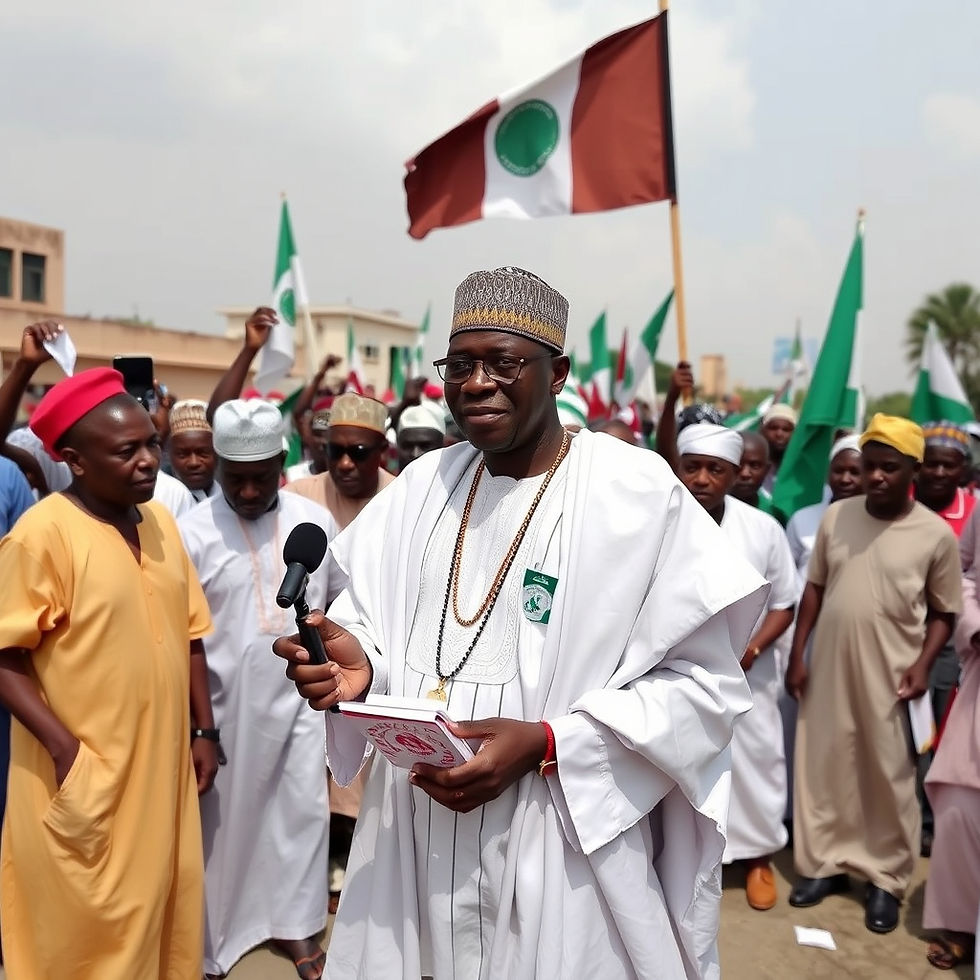Win 2027 Elections for Nigeria’s Future
- Jun 29, 2025
- 4 min read

As Nigeria approaches the 2027 elections, a critical moment is at hand for its citizens. This election is not just another event on the calendar; it represents a pivotal opportunity to redefine the country's political landscape and forge a brighter future. Participation in the electoral process is not merely a right, but a vital component for ensuring the people's voice resonates strongly in government.
The current political climate in Nigeria is a complex mix of optimism and frustration. Many citizens express their dissatisfaction with ongoing issues such as corruption, poor governance, and economic struggles. With over 60% of Nigerians feeling disconnected from political processes, the 2027 elections present a significant chance to unite and uplift the collective aspirations of the people while promoting accountability and sustainable development.
Understanding the 2027 Elections
The 2027 elections will cover various local and national positions, including the presidency, Senate, and House of Representatives. Recognizing the complexity of this electoral process is essential. Citizens should familiarize themselves with political parties, their platforms, and the backgrounds of their candidates.
For instance, the last elections saw a turnout of just 35%, highlighting a critical need for informed voting. To influence the nation's governance effectively, voters should dive deeper into the candidates' records and policy proposals. Attending local discussions, engaging in community forums, and utilizing online resources can empower citizens with the necessary information to make educated decisions.
The Role of Political Parties
Political parties are central to any democracy, and in Nigeria, they have a crucial role in the upcoming elections. It is their duty to present trustworthy candidates who can confront the significant challenges facing the nation. The onus is not solely on the parties; citizens must also step up to ensure accountability.
Leading up to the elections, parties should prioritize grassroots engagement, aiming to connect their policies with the needs of the people. They should strive for inclusivity, reaching out to various demographic groups, including women and youth, to promote solidarity and collective progress.
Youth Participation
The youth in Nigeria represent a formidable portion of the electorate, making their involvement in the elections even more vital. Despite their potential influence, young people often feel sidelined in political conversations. The 2027 elections offer a unique platform for them to express their views and demand representation aligned with their ideals.
Organizations and movements dedicated to youth empowerment must ramp up their efforts. Initiatives like voter registration drives, debates in schools, and awareness campaigns can work wonders in mobilizing the youth. For example, in the last election cycle, more than 50% of first-time voters were between 18-30, demonstrating the power this demographic can wield when united.
Addressing Key Issues
As the 2027 elections approach, a host of pressing issues require attention:
Corruption: One of the most alarming facets of governance in Nigeria, over 90% of Nigerians surveyed indicate they distrust government institutions. Candidates must present clear plans to combat corruption and improve transparency.
Security: With escalating violence from communal conflicts and terrorism, policies to enhance citizen safety must be at the forefront of candidates' proposals. For instance, a survey revealed that 70% of people are concerned about their security daily.
Economy: High unemployment rates, currently around 33%, along with soaring inflation, necessitate actionable economic recovery plans. Candidates need to put forth realistic strategies for job creation and revitalizing local businesses.
Education and Healthcare: Investments in these sectors are crucial. As of now, nearly 25% of Nigerian children are out of school. Candidates who emphasize educational reforms and healthcare improvements can significantly influence voting choices.
By focusing on these key issues, candidates can connect meaningfully with voters, presenting viable solutions that foster positive political change.
Voter Mobilization and Education
A well-informed electorate is essential for a healthy democracy. Voter education campaigns need to be scaled up, emphasizing the significance of voter registration and understanding the electoral process.
Community organizations and civil groups are critical in reaching out to citizens. By hosting workshops and creating informative content, they can help engage voters in meaningful conversations about their rights and responsibilities.
The Role of Technology
In today’s technology-driven world, utilizing digital platforms can effectively enhance voter engagement and participation. Social media serves as a powerful tool for sharing information, building awareness, and campaigning for candidates.
Campaigns should incorporate technology to communicate directly with voters. Providing easy access to candidates’ manifestos and conducting virtual town halls can increase voter connection. Moreover, exploring online voting options could significantly boost participation, especially among tech-savvy youth.
Creating a Peaceful Electoral Environment
As the 2027 elections draw near, ensuring a peaceful atmosphere is vital. Political parties, candidates, and their supporters must communicate constructively and promote a spirit of respect.
Citizens also have a role to play by joining peace campaigns and advocating for ethical conduct. Establishing a culture of understanding is crucial for achieving a smooth electoral process and, ultimately, enduring national harmony.
A Call for Collective Action
The 2027 elections in Nigeria present an opportunity for transformative change. However, realizing this potential requires the participation of everyone in society. As citizens prepare to make their electoral choices, it is essential for them to remain informed, engaged, and focused on building a future that aligns with their hopes and ambitions.
The power is in the hands of every Nigerian. By embracing civic duties and championing the common good, the electorate can significantly influence the course of the country. The road to a better Nigeria is just beginning, and the elections in 2027 are a critical milestone in this journey.
With united efforts, we can envision a prosperous, united, and transparent Nigeria. Let us stand together to win the 2027 elections for Nigeria’s future.


Comments